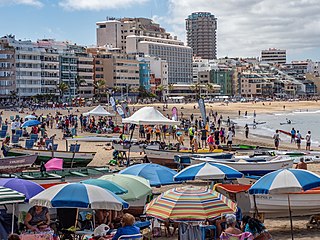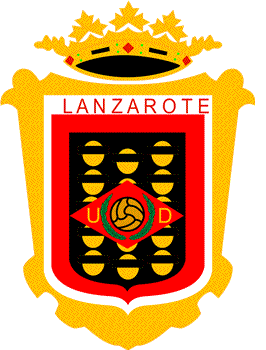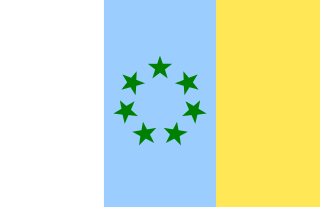
The Canary Islands, also known informally as the Canaries, are a Spanish region, autonomous community and archipelago in the Atlantic Ocean. At their closest point to the African mainland, they are 100 kilometres west of Morocco. They are the southernmost of the autonomous communities of Spain. The islands have a population of 2.2 million people and are the most populous special territory of the European Union.

Las Palmas, officially Las Palmas de Gran Canaria, is a Spanish city and capital of Gran Canaria, in the Canary Islands, in the Atlantic Ocean.

Gran Canaria, also Grand Canary Island, is the third-largest and second-most-populous island of the Canary Islands, an archipelago off the Atlantic coast of Northwest Africa and is part of Spain. As of 2023 the island had a population of 862,893 that constitutes approximately 40% of the population of the archipelago. Las Palmas de Gran Canaria, the capital of the island, is the biggest city of the Canary Islands and the ninth of Spain.

Lanzarote is a Spanish island, the easternmost of the Canary Islands in the Atlantic Ocean, 125 kilometres off the north coast of Africa and 1,000 kilometres from the Iberian Peninsula. Covering 845.94 square kilometres, Lanzarote is the fourth-largest of the islands in the archipelago. With 152,289 inhabitants at the start of 2019, it is the third most populous Canary Island, after Tenerife and Gran Canaria. Located in the centre-west of the island is Timanfaya National Park, one of its main attractions. The island was declared a biosphere reserve by UNESCO in 1993. The island's capital is Arrecife, which lies on the eastern coastline. It is the smaller main island of the Province of Las Palmas.

Unión Deportiva Las Palmas is a professional football club based in Las Palmas de Gran Canaria, Canary Islands, Spain. The club competes in La Liga, the top division in the Spanish football league system. Nicknamed Los Amarillos, the club was founded on 22 August 1949 as a result of a merger between five clubs in the Canary region. The club initially played in the Estadio Insular before hosting their home matches at the Estadio Gran Canaria in 2003.
Isleños are the descendants of Canarian settlers and immigrants to present-day Louisiana, Puerto Rico, Texas, Cuba, the Dominican Republic, Venezuela, and other parts of the Americas. In these places, the name isleño was applied to the Canary Islanders to distinguish them from Spanish mainlanders known as "peninsulars". Formerly used for the general category of people, it now refers to the specific cultural identity of Canary Islanders or their descendants throughout Latin America and in Louisiana, where they are still called isleños. Another name for Canary Islander in English is "Canarian." In Spanish, an alternative is canario or isleño canario.

Unión Deportiva Lanzarote is a Spanish football team based in Arrecife, Lanzarote, in the autonomous community of Canary Islands. Founded in 1970 it plays in Tercera Federación – Group 12, holding home games at the Ciudad Deportiva de Lanzarote, a 6,000-seat stadium which is shared with CD Orientación Marítima.

Manuel Mora Morales is a Canarian writer, filmmaker and editor. He completed his studies at the University of La Laguna on the island of Tenerife. He is the president of the Asociación de Editores de Canarias.

The Movement for the Self-Determination and Independence of the Canary Islands, was an independentist organization and socialist nature, founded in 1964 by Antonio Cubillo, whose objective was the secession of the Canary Islands from Spain. During the 1970s it operated through two terrorist groups: the Guanche Armed Forces (FAG) and the Canarian Armed Detachments (DAC), directly, but unintentionally causing one death, and indirectly causing 583 deaths and 61 injuries. It maintained good relations with other terrorist groups, mainly First of October Anti-Fascist Resistance Groups (GRAPO), who provided it with weapons and explosives, and with socialist Arab governments, such as Libya and Algeria, which provided financing and in Algiers they had a radio station. Also MPAIAC radio programs asked the Canarian people to "return to their roots" and tried to popularize the Berber language.
Canary Islanders, or Canarians, are the people of the Canary Islands, an autonomous community of Spain near the coast of northwest Africa. The distinctive variety of the Spanish language spoken in the region is known as habla canaria or the (dialecto) canario. The Canarians, and their descendants, played a major role during the conquest, colonization, and eventual independence movements of various countries in Latin America. Their ethnic and cultural presence is most palpable in the countries of Uruguay, Venezuela, Cuba and the Dominican Republic as well as the U.S. territory of Puerto Rico.
Alfonso Silva Placeres was a football player considered one of the best in the history of Canary Islands' football.
The Canary Islands derby is any football match contested between Spanish sides UD Las Palmas and CD Tenerife, who are regarded as the top two sides in the Canary Islands. World Soccer Magazine rated it as one of the 50 greatest rivalries in the world, and it is considered one of the most important derbies in Spain.
Alejandro "Álex" Castro Martín is a Spanish former footballer who played as a midfielder.
Canarian Americans are Americans whose ancestors came from the Canary Islands, Spain. They can trace their ancestry to settlers and immigrants who have emigrated since the 16th century to the present-day United States. Most of them are descendants of settlers who immigrated to Spanish colonies in the South of the modern US during the 18th century. The Canarians were among the first settlers of the modern United States; the first Canarians migrated to modern Florida in 1569, and were followed by others coming to La Florida, Texas and Louisiana.
The following is a timeline of the history of the city of Las Palmas, Canary Islands, Spain.

José Antonio Sosa Diaz-Saavedra is a Spanish architect, university professor and researcher. He is a member of the Royal Canarian Academy of Fine Arts of St. Michael Archángel.
As in the rest of Spain, the majority religion in the Canary Islands is the Catholic Church. The Catholic religion has been the majority since the Conquest of the Canary Islands in the fifteenth century. This religion would largely replace the Canarian aboriginal religion through the prohibition of the latter and syncretism. According to a survey conducted in 2019, Canary Islands is the fifth autonomous community in Spain with the highest percentage of people who declare themselves to be Catholics after the Region of Murcia, Extremadura, Galicia, Aragon, and Castile and León. 76.7% of the population is Catholic.

The Canarian Football Federation is the football association responsible for all competitions of any form of football developed in the Canary Islands. It is integrated into the Royal Spanish Football Federation and its headquarters are located in Santa Cruz de Tenerife.
Arsenio Arocha Guillén was a Spanish footballer who played as a midfielder for Madrid FC and Real Betis, winning a Copa del Rey with the former in 1934 and a La Liga title with the latter in 1934–35. He was also known as Arocha II in order to be distinguished from his older brother Ángel Arocha. He later became a manager, taking charge over UD Las Palmas in 1950.

Rafael Oramas Navarro was a Spanish footballer who played as a forward for RCD Espanyol and Racing de Madrid.











